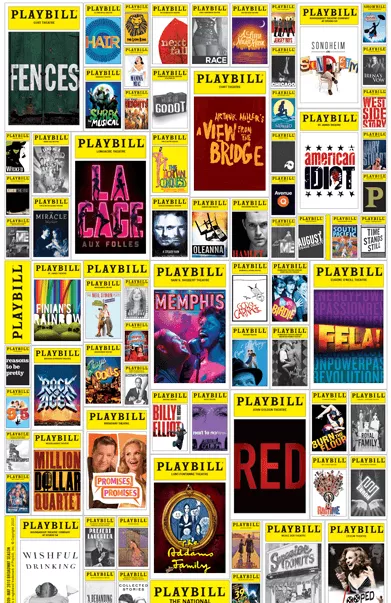If you're familiar with broadway theaters, you're sure to feel intimate with this pamphlet with its striking yellow and black title. But you may not know that this has now become the standard on Broadway, the century-old history behind the family history.

In 1884, New York businessman Frank Vans Strauss saw a new business opportunity in the booming performance industry, lobbying the major theaters in New York to provide them with free magazine-style programs, and on the other hand, began to sell advertising space in the program list in large quantities. This new form of program list was also widely praised by the audience, and these theater fans began to collect the program list as a souvenir of the theater.
By 1918, they had taken over all broadway theater productions, and the scope was constantly expanding.
The cover format of the early Playbill was not yet uniform
Of course, Playbill's development path has not been smooth.
In the United States, there is another publication called Stagebill that is also active in major theaters in the United States. But unlike Playbill, which specializes in theater, Stagebill chose to provide a program for concerts, operas, dances, and other programs at venues including Lincoln Center and Carnegie Hall, and the two companies have been at peace for decades.
By the end of the 20th century, however, Playbill had made high profits, and Stagebill was unable to make ends meet, with an annual loss of millions. To increase revenue, Stagebill decided to take a piece of Playbill's pie — in 1995, it signed a contract with Disney to play The Lion King at the new Amsterdam Theater because Playbill's program list included advertisements for alcohol and tobacco, contrary to Disney's corporate policies.
In response to this situation, Playbill quickly attacked. They created the sister publication Showbill and promised Disney complete autonomy in its advertising content, and Disney quickly turned against it. At the same time, Showbill also won the musical "Ragtime" produced by the Ford Center for the Performing Arts, promising that no other car brand would appear in the field magazine.
Disney's defection
After securing his turf, Playbill began a counterattack plan, high-profile invasion of Stagebill's deep-rooted art scene, winning many of the latter's classic art venue customers.
In 2002, Playbill signed a contract with Carnegie Hall, which won the Metropolitan Opera Company and the New York Philharmonic Orchestra, and the two groups officially became the once resident group of Lincoln Center for the Arts, the base of Stagebill, which became the last straw that crushed Stagebill. The fierce confrontation, which lasted for five years, ended with Stagebill declaring bankruptcy and Playbill acquiring its trademark.
For some time afterward, showbill was used in showbill at Disney's New Amsterdam Theater to imply that its advertising content mix was different from other Playbills.
Today, Playbill's monthly circulation has exceeded four million, in addition to the standard black letters on a yellow background, Playbill will also put customized covers on special days or for special shows, such as the annual "Gay Pride Month" official release rainbow background Playbill, and on Broadway phenomenon musical "Magic Bad Witch" "Mamma Mia! When "Queen of Boots" ushered in the five-week/tenth anniversary, the official also produced a green, blue, and red titled Playbill to congratulate it.
"Gay Pride Month" Special Edition PLAYBILL
Magical Bad Witch 10th Anniversary Special Edition
"Mamma Mia! 10th Anniversary Special Edition
Queen of Boots Fifth Anniversary Special Edition
As the company's market capitalization increased, Playbill's business footprint expanded, and it began to expand into other pan-theatrical products other than publishing, including websites, radio, records, and peripheral products.
In 1994, the official Playbill website was launched, covering performance information, theater information, special features, peripheral sales, ticket purchase channels, and shopping, food, hotels, job recruitment and other information around the theater, and like the field magazine, it is completely free of charge. Today, the site has over two million monthly active users and 400,000 mailbox subscribers.
More interestingly, in 2011, they launched the custom travel brand Playbill Travel, which includes a Broadway cruise program that allows visitors to enjoy a pleasant cruise while enjoying a specially customized performance for them.
At the same time, Playbill has also embarked on a new development across the industry — in 2021, after a campaign to increase the transparency and fairness of pay, Playbill introduced a new "pay-for-pay" rule that requires all job posters on the site to include salary levels in their notes.
After a century of hard work, Playbill has become an integral part of American theater. However, in the face of the double impact of the epidemic and streaming media, can the US theater industry continue to be its cool tree, and will it face the choice of new formats? Let's wait and see.